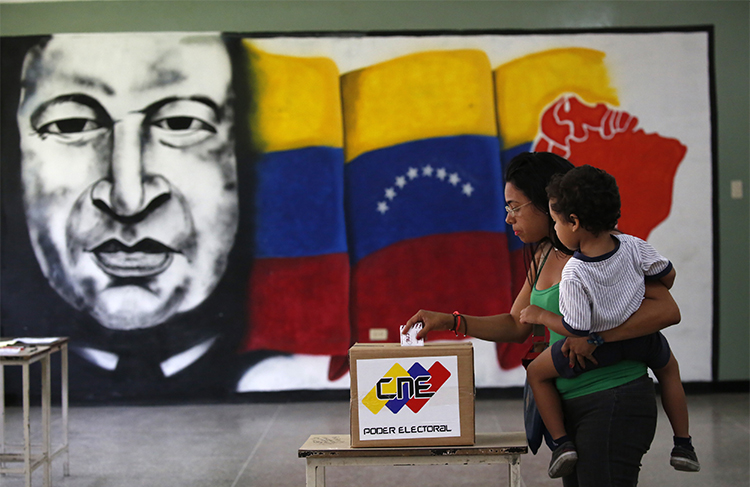New York, July 31, 2017–Venezuelan officials should stop harassing journalists and censoring media outlets amid unrest and violent protests in the country, the Committee to Protect Journalists said today. Journalists covering yesterday’s vote to elect representatives for a constituent assembly to reform the Venezuelan constitution were arbitrarily detained, attacked, and threatened.
At least four journalists were detained, protesters attacked two photographers and stole their equipment, and a soldier threatened journalists, according to local press freedom groups and news reports. Authorities also impeded journalists’ ability to cover voting and the president called for a television station to be investigated over its coverage of the vote and unrest, according to news reports.
“The political crisis in Venezuela has created an environment in which harassment and physical violence are part of the daily routine for many journalists, and news outlets are blocked from reporting,” said Carlos Lauría, CPJ’s senior program coordinator for the Americas. “The Venezuelan people have a right to know about vital events, and authorities must ensure that media outlets are able to provide that information without facing restrictions or violence.”
Police yesterday detained Felipe Royet, a photojournalist for Spanish weekly Cambio16, in Caracas, and Brigitte Gerdel and Daniel Rodríguez, from the news site Las Noticias de Cojedes, in San Carlos, according to the National Union of Press Workers. The national intelligence agency detained Venevisión reporter Euclides Sotillo in Caracas. All four were later released without charge, the union reported.
Also yesterday, a video recorded by digital news outlet VivoPlay in the El Paraíso neighborhood of Caracas appeared to show a National Guard soldier threatening to break journalists’ equipment if they continued filming. Venezuela’s National Guard did not immediately respond to CPJ’s emailed request for comment.
Separately, freelance photojournalist Fabiola Ferrero told CPJ that a group of at least 20 armed civilians–known as colectivos– threatened her and a fellow photographer and robbed them in Caracas. Ferrero said the group asked the journalists who they worked for, then forced them to hand over their vests, gas masks, helmets, camera equipment, and cell phones.
Colectivos have been responsible for several incidents of threats, harassment, and violence against journalists since protests began in late March, CPJ has found. Ferrero told CPJ that polarization in the country has increased the risk for journalists. “Whoever sees a journalist sees us as a threat. It doesn’t matter who they are or what group they’re part of,” she said.
Authorities also imposed restrictions on journalists covering the vote. At a press conference on July 28, Tibisay Lucena, president of the National Electoral Council, the entity responsible for overseeing the voting process, announced that media outlets would be required to stay at least 500 meters (approx. 1,600ft) from voting centers.
The council also denied credentials to at least nine of the 15 media outlets that requested credentials to cover the July 30 vote, according to the Caracas-based Institute for Press and Society (IPYS Venezuela). Three employees at the National Electoral Council press office told CPJ they were not authorized to comment on press credentials.
The government has used visa restrictions to deny at least four international journalists entry to Venezuela to cover the constituent assembly vote, according to local press freedom groups and news reports.
Separately, President Nicolás Maduro called for the state telecommunications regulator Conatel to investigate the privately owned television network Televen for “apologizing for crimes,” according to news reports. The president made his comments during a television appearance broadcast at 12:30 a.m. today. Maduro criticized Televen for its coverage of the vote, saying the outlet instead preferred to show “the fire in Altamira”–referring to an explosion in a Caracas neighborhood that injured at least three police officers, according to reports.
Violent protests against the Maduro government and counter-protests have been held since late March. At least 10 people died yesterday in the deadliest day of unrest to date, bringing the number of people killed since protests began to more than 120, according to news reports. In a statement on July 28, Maduro blamed protesters for the violence and said they were trying to start a civil war, according to reports.
